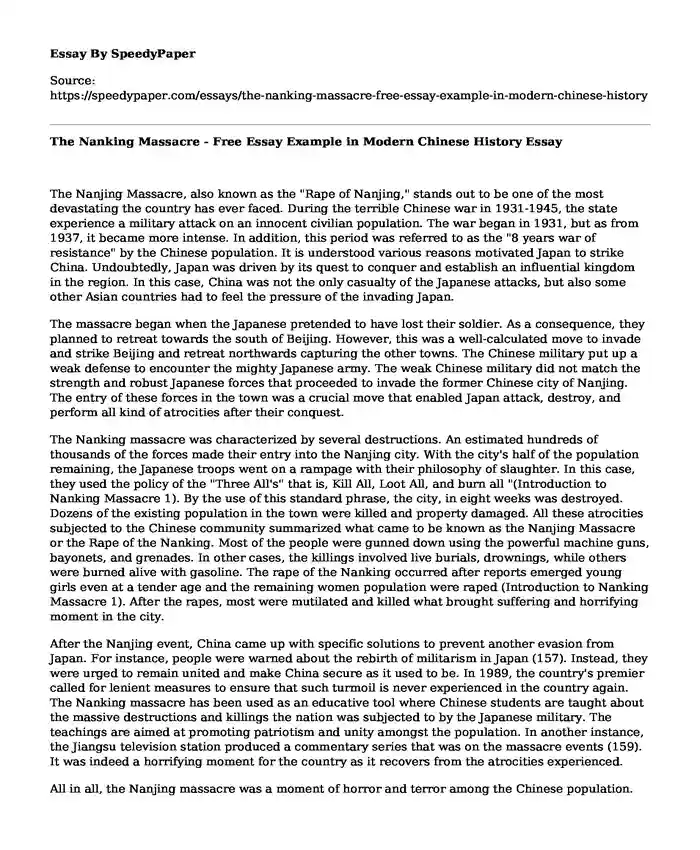The Nanjing Massacre, also known as the "Rape of Nanjing," stands out to be one of the most devastating the country has ever faced. During the terrible Chinese war in 1931-1945, the state experience a military attack on an innocent civilian population. The war began in 1931, but as from 1937, it became more intense. In addition, this period was referred to as the "8 years war of resistance" by the Chinese population. It is understood various reasons motivated Japan to strike China. Undoubtedly, Japan was driven by its quest to conquer and establish an influential kingdom in the region. In this case, China was not the only casualty of the Japanese attacks, but also some other Asian countries had to feel the pressure of the invading Japan.
The massacre began when the Japanese pretended to have lost their soldier. As a consequence, they planned to retreat towards the south of Beijing. However, this was a well-calculated move to invade and strike Beijing and retreat northwards capturing the other towns. The Chinese military put up a weak defense to encounter the mighty Japanese army. The weak Chinese military did not match the strength and robust Japanese forces that proceeded to invade the former Chinese city of Nanjing. The entry of these forces in the town was a crucial move that enabled Japan attack, destroy, and perform all kind of atrocities after their conquest.
The Nanking massacre was characterized by several destructions. An estimated hundreds of thousands of the forces made their entry into the Nanjing city. With the city's half of the population remaining, the Japanese troops went on a rampage with their philosophy of slaughter. In this case, they used the policy of the "Three All's" that is, Kill All, Loot All, and burn all "(Introduction to Nanking Massacre 1). By the use of this standard phrase, the city, in eight weeks was destroyed. Dozens of the existing population in the town were killed and property damaged. All these atrocities subjected to the Chinese community summarized what came to be known as the Nanjing Massacre or the Rape of the Nanking. Most of the people were gunned down using the powerful machine guns, bayonets, and grenades. In other cases, the killings involved live burials, drownings, while others were burned alive with gasoline. The rape of the Nanking occurred after reports emerged young girls even at a tender age and the remaining women population were raped (Introduction to Nanking Massacre 1). After the rapes, most were mutilated and killed what brought suffering and horrifying moment in the city.
After the Nanjing event, China came up with specific solutions to prevent another evasion from Japan. For instance, people were warned about the rebirth of militarism in Japan (157). Instead, they were urged to remain united and make China secure as it used to be. In 1989, the country's premier called for lenient measures to ensure that such turmoil is never experienced in the country again. The Nanking massacre has been used as an educative tool where Chinese students are taught about the massive destructions and killings the nation was subjected to by the Japanese military. The teachings are aimed at promoting patriotism and unity amongst the population. In another instance, the Jiangsu television station produced a commentary series that was on the massacre events (159). It was indeed a horrifying moment for the country as it recovers from the atrocities experienced.
All in all, the Nanjing massacre was a moment of horror and terror among the Chinese population. Destruction of property, looting, and killing of hundreds of thousands of soldiers and the community was a sad period among the remaining citizens. However, the country has enacted measures that promote patriotism and unity. The state is now in a reconciling mood as it recovers from the devastating atrocities it experienced.
Works Cited
Introduction to Nanking Massacre: "The Rape of Nanking." Retrieved from http://www.alpha-canada.org/wp-content/themes/bcalpha-theme/Asian-Holocaust/Rape-of-Nanking/PDF_Intro_Nanking%20Massacre.pdf Accessed 7 April 2018.
Yoshida, Takashi. The Making of the "Rape of Nanking": History and Memory in Japan, China, and the United States. Oxford: Oxford University Press, 2009. Internet resource.
Cite this page
The Nanking Massacre - Free Essay Example in Modern Chinese History. (2022, Apr 28). Retrieved from https://speedypaper.com/essays/the-nanking-massacre-free-essay-example-in-modern-chinese-history
Request Removal
If you are the original author of this essay and no longer wish to have it published on the SpeedyPaper website, please click below to request its removal:
- E-government Framework Essay Sample
- Project Management Essay Example: The Move Plan and the Needs Analysis
- Free Essay in IT Project Management
- Free Essay Sample on Courage and Calling
- Free Essay on Rhetorical Strategies in 'Obamacare Is an Unstable Economic Model'
- Free Essay. Indirect Nursing Activity: Managing Healthcare-Associated Infections
- Essay Sample on Orthodox Spirituality
Popular categories





